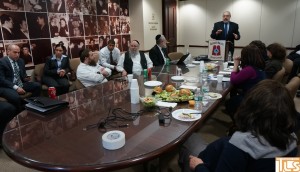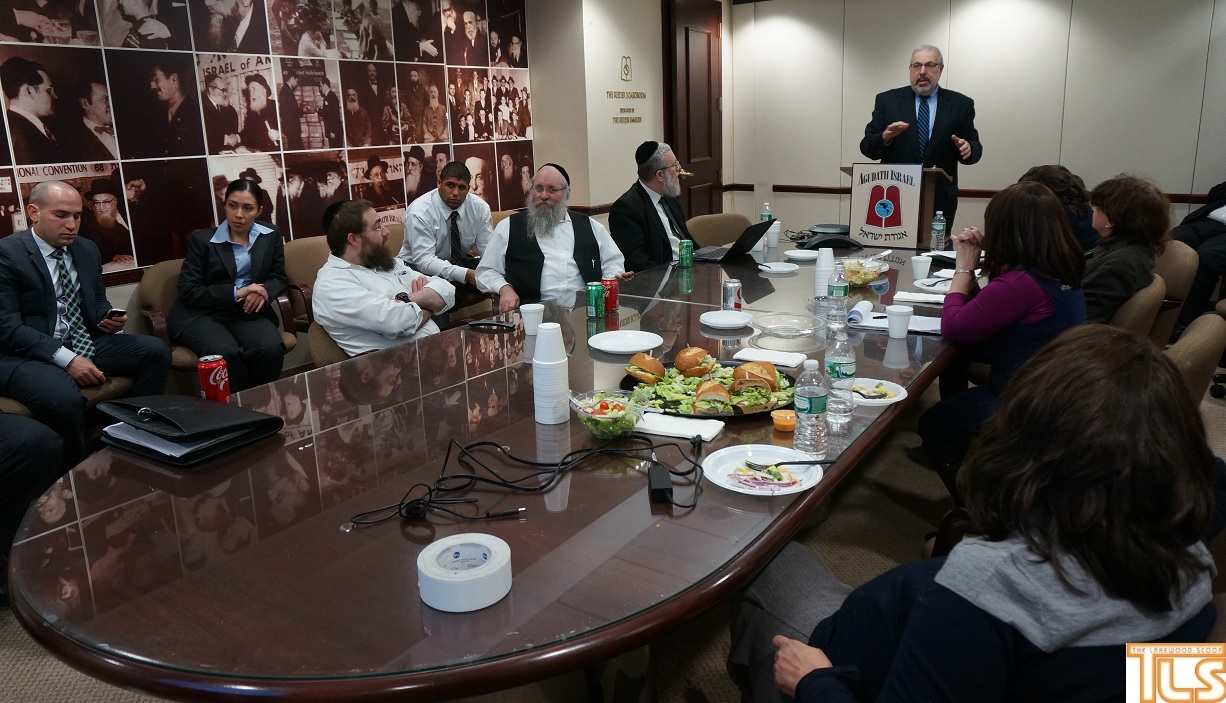 By: Shimmy Blum. As the dangers of our volatile world hit Jewish community after Jewish community, Agudath Israel of America’s Yeshiva Services Division hosted a special webinar on Tuesday, tackling the issue of security for our community’s schools and shuls.
By: Shimmy Blum. As the dangers of our volatile world hit Jewish community after Jewish community, Agudath Israel of America’s Yeshiva Services Division hosted a special webinar on Tuesday, tackling the issue of security for our community’s schools and shuls.
The two hour webinar was exceptionally comprehensive and interactive. The safety of children and mispallelim are any leader’s number one priority. Approximately 150 representatives of schools and shuls across America participated in the webinar. They were from communities in all regions of the country, representing the cross section of Orthodox Jewry. Rabbi Chaim Dovid Zwiebel, executive vice president of Agudath Israel of America, welcomed the participants. He explained that the large and diverse participation proved that our institutions increasingly recognize the importance of security and are prepared to take the necessary steps for improvement.
Mr. Richard Altabe, headmaster at Yeshiva Shaare Torah in Brooklyn, elaborated upon the recent highly publicized incident at the school, where the security guard confronted a disturbed individual who entered the building and refused to leave. Mr. Altabe stressed the importance of every school maintaining a vigilant mindset, and taking steps in advance to protect their facilities. “It can happen to anyone and it is your responsibility to protect students,” he implored.
Frightening Scenarios
Our schools are symbolized by sweet voices of happy children learning and playing. Nevertheless, a school can turn into a horror scene in a moment, Heaven forbid, as tragically, we saw in the Sandy Hook incident and others.
Specialists with the NYPD Counterterrorism Bureau’s SHIELD Unit delivered a fascinating presentation detailing the scenarios that can take place during an active shooter or other criminal or terrorist event at a school. They elaborated upon the pointers that staff must look out for during any suspicious incident, and how they should decide what steps to take. They explained that an active shooter incident typically lasts between six to eleven minutes. Therefore, every second counts; every move can save lives.
The officers stressed a range of steps that every school should take to protect its inhabitants. They include familiarizing themselves with the facilities, establishing safe zones wherever possible, and training staff members in their proper roles and the crucial dos-and-don’ts in the event of an emergency. One particularly important step is to hold safety drills on a regular basis so that staff and students can practice the proper response to such scenarios, just as schools commonly hold fire drills.
Timely Assessments Pay Off
Despite the dangers that we’re all aware of, the presenters stressed that administrators and principals should not panic, but rather take the most rational and effective steps to increase security.
A representative from the Downstate Operations Unit of the New York State Division of Homeland Security and Emergency Services discussed the appropriate steps for individual institutions to commission a professional vulnerability assessment of their facilities. He related how one school administrator he worked with held his position for over a decade, but admitted that he was unaware that a particular room existed in the school!
Professional vulnerability assessors can identify each institution’s strengths and weaknesses, and recommend the most effective steps to improve security. These professionals can help schools properly prioritize specific security enhancements, instead of reflexively implementing the most commonly known ones.
The 2015 Nonprofit Security Grant
The final presenter was David Pollock, associate executive director and director of government relations and security, for the Jewish Community Relations Council of New York. Mr. Pollock discussed the federal 2015 Nonprofit Security Grant Program.
The program offers security grants to private schools and other nonprofit institutions that are determined to be at a particularly high risk. Congress recently passed a measure that contains $13 million in funding for this program nationally, for this year. Mr. Pollock explained that the first step necessary for an institution to obtain funding through the program is to commission a professional vulnerability assessment, which schools and shuls interested in applying for the grant should be working on now.
“It is extremely important that we, as a community, continue to maintain a heightened awareness of the dangers we face, ” said Mrs. Deborah Zachai, Agudath Israel’s director of education affairs and organizer of the event. We are hopeful that our webinar helped the mosdos around the country gain a greater awareness of those dangers and the steps to take to prepare for any threat or worse, Chas V’Shalom. Even as we make every hishtadlus in this area, we daven that Hashem offer us the Heavenly protection we need at every moment.”
[TLS]

